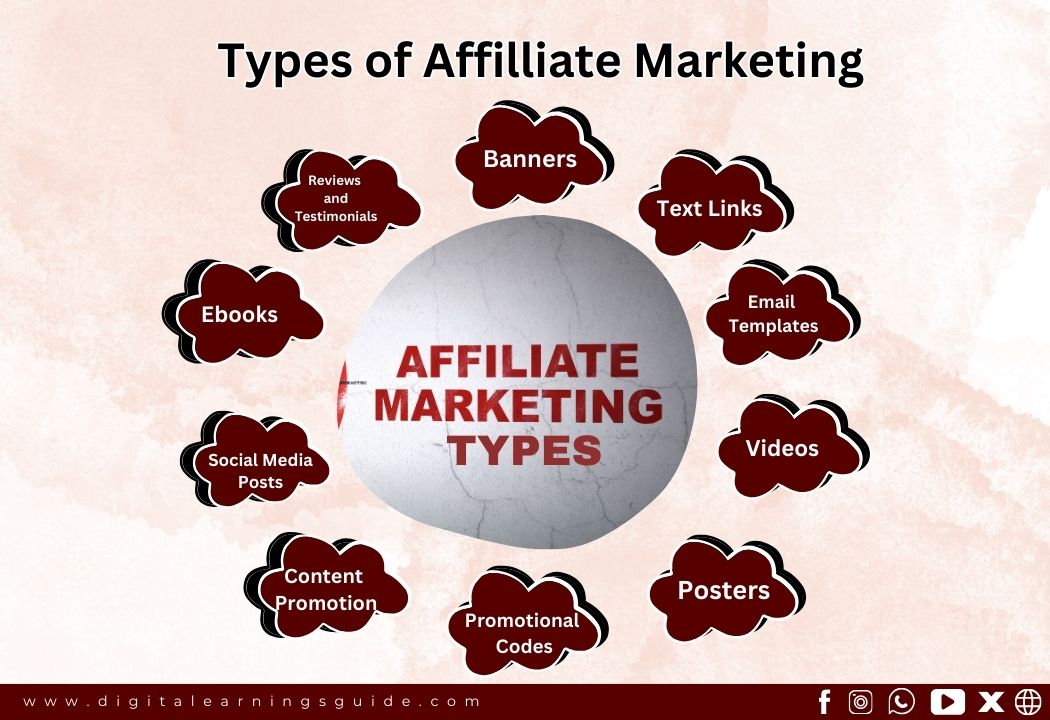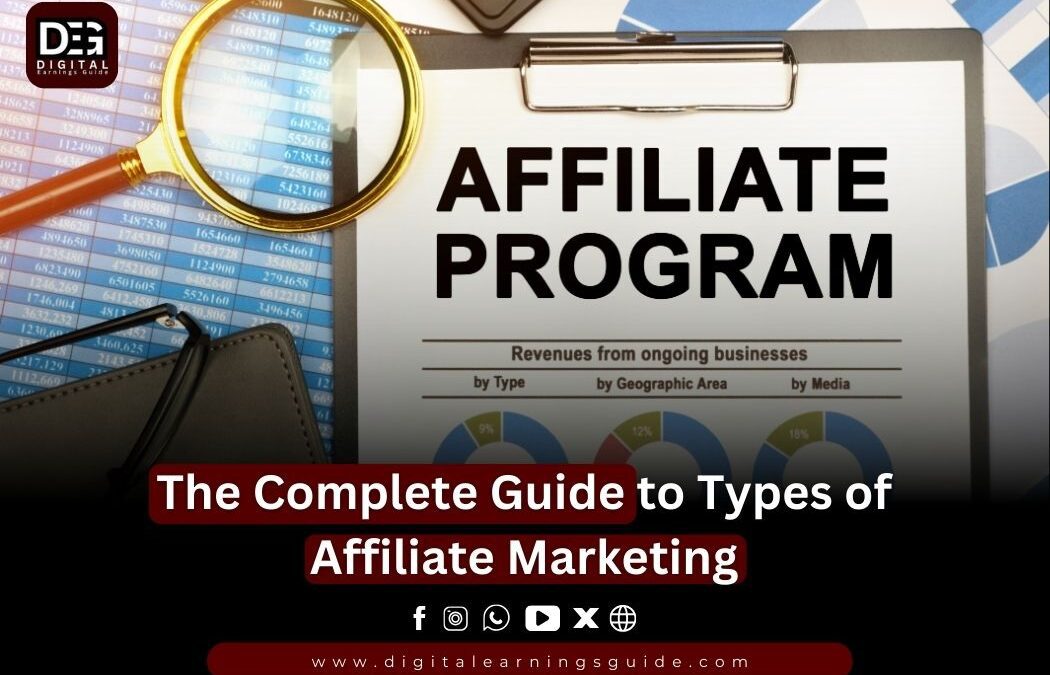The Complete Guide to Types of Affiliate Marketing
Affiliate marketing is a performance-based marketing strategy where individuals or businesses earn commissions by promoting products or services. It can take various forms depending on the level of involvement and relationship the affiliate has with the products they promote. Understanding the different types—unattached, related, and involved—can help affiliates choose the right approach to maximize their success while catering to their audience’s needs. In our previous blog, we briefly explained about Affiliate marketing and How it’s works now in this article we discuss about types of Affiliate marketing.
What we discuss in this article
| · Types of Affiliate Marketing
· Strategies for Success in Affiliate Marketing · Tools and Resources for Affiliate Marketers |
Types of Affiliate Marketing
“Affiliate Marketing Materials” are materials that an Affiliate provides to its audience, customers, or website visitors to promote and promote a particular product or service. There are different types of content, tailored to different affiliate marketing strategies and media platforms. Here are some common types of affiliate Marketing:

-
Banners
Banners are graphically designed advertisements that appear on various websites. These are usually in image format and include a link to the product or service. Banners are clickable, leading the user to an affiliate site. Some of their features:
- Can be dynamic or static.
- Available in different sizes to accommodate the layout of websites.
- They are visually appealing and attention grabbing.
-
Text Links
Text links are simple text links that refer to a product or service. These links are usually included in affiliate website articles or blogs and when clicked take the user to the desired page. Their features:
- Suitable for SEO (Search Engine Optimization).
- Can be incorporated more naturally within the content.
- Demand less attention but can be more effective if used in the right context.
-
Email Templates
These are pre-made email designs that are given to affiliate marketers to send to their customers. These templates help market the company or product and include links that encourage customers to purchase the product. Their features:
- Used in personalized email campaigns.
- Helps in creating direct relationship with customers.
- Special deals or offers are effective.
-
Videos
Videos are an effective way for affiliate marketers to educate their audience about the features and benefits of a product or service. These videos can be uploaded to YouTube, social media platforms or websites. Videos via:
- The product can be fully demonstrated.
- Customer attention can be captured through both visual and audio means.
- Links to videos can be shared on various platforms.
-
Posters
Posters are graphic materials created to advertise a product or service. These are mostly used on social media platforms and are especially suitable for visual platforms like Instagram or Facebook. Their features:
- are based on graphic design.
- High resolution and attractive.
- Often used for sales and special offers.
-
Promotional Codes
Promotional codes are used in affiliate marketing to give customers specific discounts or offers. These codes influence the customer’s purchase process and are often provided through social media or blogs. Features:
- Help increase direct sales.
- Let customers experience a special discount or offer.
- Can be easily disseminated through various marketing channels.
-
Content Promotion
Affiliate marketers often write blogs, articles, or detailed guides to explain the features and benefits of using a product or service. This type of content provides information to consumers about the product and helps them make a purchase decision. Features:
- With the help of SEO, customers are attracted through the blog.
- Long and detailed articles include product analysis.
- Content can be integrated with links and banners.
-
Social Media Posts
Social media is a powerful tool for affiliate marketing. Affiliate marketers can direct their audience to a product or service through promotional posts on Facebook, Instagram, Twitter, and LinkedIn. Features of Social Media Posts:
- Has the ability to respond quickly.
- Can be shared widely.
- Various content such as videos, images and links can be presented.
-
Ebooks
Sometimes affiliate marketers create detailed ebooks about a product or service that tell their customers the full benefits and how to use the product. These eBooks are usually provided during a special marketing campaign and include affiliate links. Features:
- Provide informative and educational content.
- Provide customers with complete knowledge about the product.
- Links can be used to entice customers to make a purchase.
-
Reviews and Testimonials
Reviews and comments are an important part of affiliate marketing. Affiliate marketers often include their own personal experiences with the product or comments from other users so that customers can trust the product. This content:
- It helps in giving customers confidence in the product.
- It is based on individual experiences.
- Demonstrates practical use of the product.
Strategies for Success in Affiliate Marketing: The Complete Guide
Affiliate Marketing is an effective and profitable way to earn money in the online business world. The principle is simple: you promote a company or product, and when someone makes a purchase from the link you provide, you get a commission. However, becoming a successful affiliate marketer requires more thought and strategy than simple promotion.
Here we will discuss in detail some key strategies for success in affiliate marketing:
-
Choose the right product and niche
The first and most important step to success in affiliate marketing is choosing the right niche and product.
How should you choose a niche?
- Interest and Expertise: Choose a product or niche that you have a personal interest or knowledge about. If you are passionate about a topic, you will create content better and with more passion.
- Profitable Market: You should find a niche that is profitable. You should research which products or services are in high demand and which companies offer good commissions.
- Competition research: If there is a lot of competition in the niche, it may be difficult to succeed. You should research your target market and competition so that you can make a better decision.
-
Choosing reliable affiliate programs
Not all affiliate programs are created equal. You should choose programs and networks that are profitable and reliable for you.
How should you choose affiliate programs?
- Commission Rates: You should choose programs that give high commission, but commission alone is not enough. Product quality and demand are also important to look at.
- Payout Terms: Some programs have minimum thresholds for earning commissions. It is important to know when and how you will receive payment.
- Tracking Accuracy: Choose programs that provide efficient tracking systems so you can accurately track each cell.
-
Creation of effective and quality content
Content quality is paramount in affiliate marketing. Your content informs customers about the benefits of the product and how it meets their needs. Quality content not only increases your credibility but also helps in persuading customers.
What kind of content is effective?
- Blog Posts and Articles: Write articles on your website or blog that review the product in detail and highlight its benefits.
- Video Content: Provide product reviews or demonstrations on YouTube or other video platforms.
- eBooks and Guides: Provide informative eBooks or guides related to the product or service that can help customers solve their problems.
- Comparisons: Comparing different products in the same niche helps consumers make better decisions.
-
Focus on SEO (Search Engine Optimization)
SEO is critical to affiliate marketing success, as it helps your website or content rank better in Google and other search engines. More traffic means more commissions.
Important aspects of SEO:
- Keyword Research: You should find keywords that are relevant to your niche and have high search volume.
- On-page SEO: You should add proper meta titles, meta descriptions, headings and alt tags on all pages of your website.
- Backlinks: Getting links from other reputable websites will help increase your website’s authority.
-
Build trust with customers
Gaining the trust of customers is essential for any affiliate marketer. You must demonstrate integrity and transparency in your content.
How can trust be built?
- Honest Reviews: Always provide realistic and honest reviews. Do not stretch any product unnecessarily.
- Customer Feedback: Include customer reviews or experiences in your content if possible. This will help other users make a better decision about the product.
- Personal Experiences: If you have used a product yourself, share your personal experiences as well. This makes the content more believable.
-
Use of email marketing
Email marketing is a powerful tool through which you can provide product information and stay in touch with your audience.
Email Marketing Tips:
- Create an email list: Provide a sign-up option on your website so you can email customers about special offers or new products.
- Personalization: Personalize your emails and deliver content tailored to each customer’s interests.
- Remarketing: If someone has shown interest in a product but hasn’t made a purchase, you can remind them.
-
Harnessing the power of social media
An effective social media strategy can play a major role in your success.
Social Media Strategy:
- Choosing a platform: Each social media platform has a different style and type of users. You should choose a platform according to your niche. For example, Instagram is suitable for fashion and beauty, while YouTube is best for technology.
- Regular Posts: Keep posting consistently so your followers stay engaged with your content.
- Influencer Marketing: If possible, work with celebrities or influencers to promote your products.
-
Track and improve performance
A successful affiliate marketer is one who constantly tracks their performance and improves their strategies.
Tools for Tracking:
- Google Analytics: A great tool to measure your website traffic and user behavior.
- Affiliate Programs Tracking Tools: These tools help you know which links are generating the most sales.
Benefits of Tracking:
- Opportunities for improvement: Tracking lets you know which of your strategies are more successful and where improvements are needed.
- More traffic: When you know which content is more successful, you can focus on that and get more traffic.
Tools and Resources for Affiliate Marketers: The Complete Guide
Affiliate marketing is an effective way to earn money online, but using the right strategy and quality tools is very important to be successful. Whether you’re just starting out or a seasoned affiliate marketer, the right tools and resources can improve your efficiency, save time and make your marketing campaigns more profitable.
In this blog post, we’ll discuss essential tools and resources for affiliate marketers that make your work easier and help you get results faster.
-
Keyword Research Tools
Keyword research is the first step to affiliate marketing success. You should know what keywords users are searching for and which keywords will be most profitable for you to target.
Best Keyword Research Tools:
- Google Keyword Planner: This is a free tool that gives you information about the most searched keywords on Google.
- Ahrefs: This is a paid tool that provides very detailed data, including keyword difficulty, volume, and related keywords.
- SEMrush: This is another powerful tool that provides not only keyword research but also competition research, backlink analysis, and more.
Advantages:
- It helps you choose the right keywords that can improve your website’s ranking and traffic.
- You can optimize your content strategy to provide customers with the content they are looking for.
-
SEO Tools (Search Engine Optimization Tools)
Without SEO, it becomes difficult to get your website or content featured in search engines. SEO tools help you improve your website’s performance, track keywords, and research competitors.
Best SEO Tools:
- Moz: This tool offers several features to help with SEO such as domain authority checker, backlink analysis, and on-page SEO.
- Yoast SEO (for WordPress): If you’re using WordPress, this plugin helps optimize your website for search engines.
- Google Search Console: This is a free tool that helps track your website’s search performance and provides troubleshooting guidance.
Advantages:
- Optimizes your website according to search engine algorithms.
- Provides you with opportunities that can increase your website’s ranking.
-
Affiliate Link Tracking Tools
In affiliate marketing it is very important to track your links properly to know which link is generating the most clicks, sales, or conversions.
Best Link Tracking Tools:
- ThirstyAffiliates: A WordPress plugin that easily manages your affiliate links, masks them, and gives you click tracking.
- Pretty Links: This is another WordPress plugin that makes your affiliate links short, easy to remember, and trackable.
- ClickMeter: A paid tool that gives you comprehensive tracking of clicks, conversions, and sales.
Advantages:
- You get to know where your links are performing the best and what strategy you can improve.
- You can optimize your links to make them appear more professional and credible.
-
Email Marketing Tools
Email marketing is a powerful strategy that can be very profitable for affiliate marketers. With the right email marketing tools, you can communicate directly with your customers and let them know about special offers or new products.
Best Email Marketing Tools:
- Mailchimp: This is a popular email marketing platform that allows you to easily create email lists, send emails, and track their results.
- AWeber: This tool is also widely used in email marketing and has many features for automation.
- ConvertKit: This tool is specially designed for bloggers and affiliate marketers who want to run simple and effective email marketing campaigns.
Advantages:
- You build a direct relationship with your customers.
- Can entice customers to buy through personalized messages and offers.
-
Content Management Systems (CMS) and Website Builders
Having a robust and user-friendly website is essential for affiliate marketing. CMS and website builders help you create and manage your website without coding.
Best CMS and Website Builders:
- WordPress: This is the most widely used CMS that is highly suitable for affiliate marketers as it has numerous plugins and templates available.
- Wix: A simple and user-friendly website builder that helps you create websites without any coding.
- Squarespace: This is also a website builder used to create beautiful and professional websites.
Advantages:
- You can easily build your website and customize it according to your needs.
- Using different plugins and templates can make your website look beautiful and effective.
-
Social media management tools
Social media has become an important marketing channel nowadays. Affiliate marketing is difficult to advance without an effective presence on social media platforms. Social media management tools help you manage content on different platforms and stay in touch with your followers.
Best Social Media Management Tools:
- Hootsuite: A popular tool that allows you to schedule, track, and analyze content across various social media platforms.
- Buffer: This tool also helps you manage social media posts and easily track your marketing campaigns.
- Canva: This is a graphic design tool that is very useful for creating social media posts, banners, and other visual content.
Advantages:
- You can schedule your social media content in advance, which saves you time.
- You can analyze your performance on different platforms and improve your strategy.
-
Graphic Design Tools
Visual content is very important in an effective affiliate marketing campaign. Whether you’re advertising on social media or creating images for blog posts, graphic design tools help you create professional visuals.
Best Graphic Design Tools:
- Canva: A simple and user-friendly tool perfect for creating graphics, presentations, and social media posts.
- Adobe Photoshop: If you want to create more professional designs, this is a high-quality tool.
- Crello: This is another online design tool that works similar to Canva and provides many templates.
Advantages:
- Your graphics and images make your website and social media profiles look more professional.
- Visual content attracts customers more and increases conversions.




